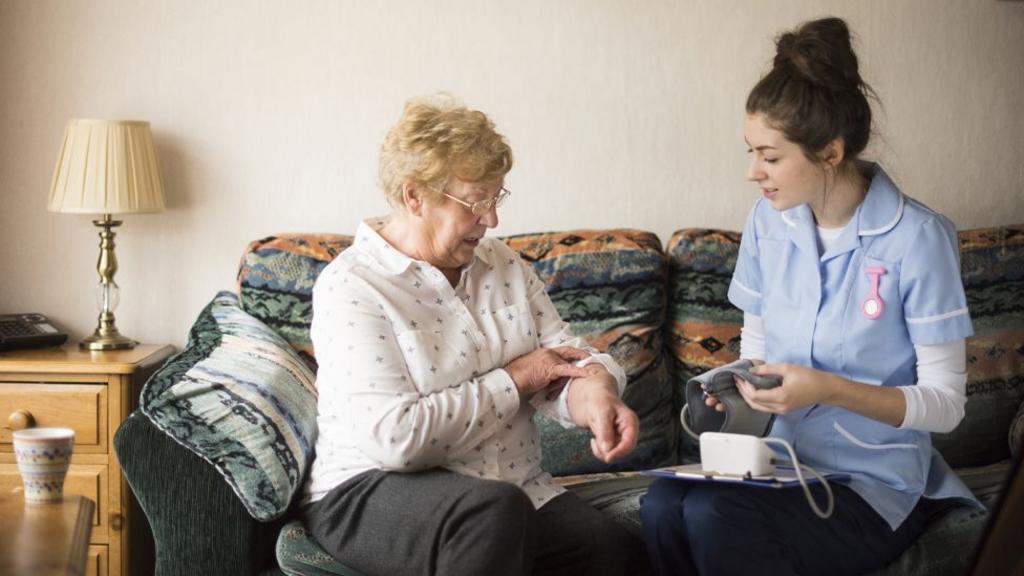Millions of patients in England are set to receive treatment closer to home under ambitious plans to “fundamentally rewire” the NHS, according to the prime minister.
The initiative involves establishing a new network of local health hubs designed to shift care provision from hospitals into community settings.
Sir Keir Starmer has emphasized the necessity for the NHS to “reform or die,” advocating for “easier, quicker, and more convenient care for patients, regardless of their location.”
However, the Royal College of Nursing has cautioned that relocating services from overcrowded hospitals will be contingent on implementing policies to bolster the “depleted and undervalued” nursing workforce.
Sir Keir unveiled the government’s 10-year strategy for the NHS in England during a speech delivered to healthcare professionals in east London earlier today.
The plan includes the establishment of approximately 200 new neighborhood health centers over the next decade, staffed by a multidisciplinary team comprising GPs, nurses, social care workers, pharmacists, mental health specialists, and other medical personnel.
These centers are projected to operate for 12 hours a day, six days a week, according to government statements.
The specific services offered will be tailored to the needs of the local area, with some outreach teams conducting home visits to engage with vulnerable and hard-to-reach patients.
“This shift is crucial, not only for the future of the NHS but also for patients, their families, and their communities, given the evolving demographics,” stated Sir Jim Mackey, the newly appointed chief executive of NHS England.
“Our current model is predicated on hospitalisation as the default, which is not suitable for everyone.”
The long-term objective is to have the majority of outpatient care delivered outside of hospital settings by 2035, including scans, mental health assessments, eye examinations, and post-operative follow-up appointments.
The government has also suggested that local hubs could provide additional services such as debt advice, employment support, smoking cessation programs, and weight management classes.
Health Secretary Wes Streeting asserted that the plan would reduce “devastating hospital waiting lists and prevent patients from being passed between multiple providers to receive treatment.”
In an interview with BBC Breakfast on Thursday, Streeting assured voters that they would “begin to see and feel” the positive effects of the plan on the NHS.
He noted that neighborhood health services are already in place in certain regions, adding that the new health centers would be prioritized for areas “with the highest levels of need” and “the most poorly served” communities.
As of April, the waiting list for operations or other planned appointments in England stood at 7.39 million.
Thea Stein, chief executive of the health think tank the Nuffield Trust, acknowledged the “right aspiration” of the plan but cautioned that shifting care closer to home “doesn’t mean care on the cheap.”
“Let’s be under no illusion: this is not a money saving measure,” she said.
“Simply saying that the approach will be rolled out, without full details on how to bring it about, casts doubt on whether it will stick.”
The government has stated that the funding for the new service will come from the £29 billion boost to NHS funding announced in the last Budget.
A new workforce plan for the health service, expected later this year, will outline targets for recruiting new staff to work in community care.
The Royal College of Nursing has highlighted the decline in the number of district nurses and health visitors, who play a critical role in ensuring patients’ safety and well-being at home, by thousands over the past 15 years in England.
The British Medical Association (BMA), representing doctors, has raised concerns about the staffing and funding of the new services.
“The limited workforce, who are already feeling undervalued must not be moved around like pieces on a chess board or made to work even harder,” said BMA council chair Dr Tom Dolphin.
The Royal College of GPs has expressed concerns about the current state of many GP practices, which are “in dire need of renovation,” and the lack of job opportunities for newly qualified GPs.
Other key elements of the plan, which spans over 150 pages, include:
Matthew Taylor, chief executive of the NHS Confederation, representing NHS service providers, emphasized the need for sustained investment in buildings and digital infrastructure for the new neighborhood health centers.
“The reality is that without the radical action outlined in this plan, the NHS as a universal service is in unprecedented danger,” he said.
Conservative MP and shadow health secretary Edward Argar stated that the NHS needs “reform, not just more cash” and cautioned that Labour’s plan must be “real and deliverable for patients.”
Liberal Democrat leader Ed Davey warned that the entire 10-year NHS strategy would be a “castle built on sand” unless ministers address what he termed a “crisis in social care.”
The new system is £5m over budget and had already been delayed by a year.
The Western Trust’s chief executive says he understands the “strength of feeling” that this issue generates.
Frank Bourne said a nurse at Maidstone Hospital told him his sick friend was “not her problem”.
George, 13, hopes to complete his final run on 7 July at the hospital where he receives treatment.
The service will be out and about across northern Lincolnshire, East Yorkshire and Hull.

